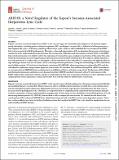ARID3B : a novel regulator of the Kaposi’s sarcoma-associated herpesvirus lytic cycle
Abstract
Kaposi's sarcoma-associated herpesvirus (KSHV) is the causative agent of commonly fatal malignancies of immunocompromised individuals, including primary effusion lymphoma (PEL) and Kaposi's sarcoma (KS). A hallmark of all herpesviruses is their biphasic life cycle—viral latency and the productive lytic cycle—and it is well established that reactivation of the KSHV lytic cycle is associated with KS pathogenesis. Therefore, a thorough appreciation of the mechanisms that govern reactivation is required to better understand disease progression. The viral protein replication and transcription activator (RTA) is the KSHV lytic switch protein due to its ability to drive the expression of various lytic genes, leading to reactivation of the entire lytic cycle. While the mechanisms for activating lytic gene expression have received much attention, how RTA impacts cellular function is less well understood. To address this, we developed a cell line with doxycycline-inducible RTA expression and applied stable isotope labeling of amino acids in cell culture (SILAC)-based quantitative proteomics. Using this methodology, we have identified a novel cellular protein (AT-rich interacting domain containing 3B [ARID3B]) whose expression was enhanced by RTA and that relocalized to replication compartments upon lytic reactivation. We also show that small interfering RNA (siRNA) knockdown or overexpression of ARID3B led to an enhancement or inhibition of lytic reactivation, respectively. Furthermore, DNA affinity and chromatin immunoprecipitation assays demonstrated that ARID3B specifically interacts with A/T-rich elements in the KSHV origin of lytic replication (oriLyt), and this was dependent on lytic cycle reactivation. Therefore, we have identified a novel cellular protein whose expression is enhanced by KSHV RTA with the ability to inhibit KSHV reactivation.
Citation
Wood , J , Boyne , J , Paulus , C , Jackson , B , Nevels , M M , Whitehouse , A & Hughes , D J 2016 , ' ARID3B : a novel regulator of the Kaposi’s sarcoma-associated herpesvirus lytic cycle ' , Journal of Virology , vol. 90 , no. 20 , pp. 9543-9555 . https://doi.org/10.1128/JVI.03262-15
Publication
Journal of Virology
Status
Peer reviewed
ISSN
0022-538XType
Journal article
Description
This work, including the efforts of Adrian Whitehouse, was funded by Wellcome Trust (089330/z/09/z). This work, including the efforts of David John Hughes, was funded by Wellcome Trust (ISSF). This work, including the efforts of Adrian Whitehouse, was funded by Biotechnology and Biological Sciences Research Council (BBSRC) (BB/K000306/1). This work, including the efforts of Adrian Whitehouse, was funded by Yorkshire Cancer Research (L366).Collections
Items in the St Andrews Research Repository are protected by copyright, with all rights reserved, unless otherwise indicated.

